HA540 Healthcare Operations: Patient Self-Management Importance
VerifiedAdded on 2023/04/23
|7
|1208
|199
Report
AI Summary
This report emphasizes the critical role of patient self-management as a priority in today's healthcare landscape, particularly in the face of challenges like inefficiency and health illiteracy. It defines patient self-management support as the systematic provision of education and supportive interventions by healthcare providers to boost patients' confidence and skills in managing their health, especially chronic conditions. The report highlights the need for evidence-based health programs focusing on problem-solving, shared decision-making, and symptom management, tailored to diverse populations and those with limited health literacy. It further discusses how primary healthcare professionals can leverage opportunities to apply evidence-based strategies for enhancing patient-provider communication and connecting patients with community health resources. The report also uses the example of diabetes patients to illustrate self-management literacy and improve operations in the education industry, emphasizing the need for collaboration among healthcare providers, educators, and community stakeholders to provide standardized self-management support.
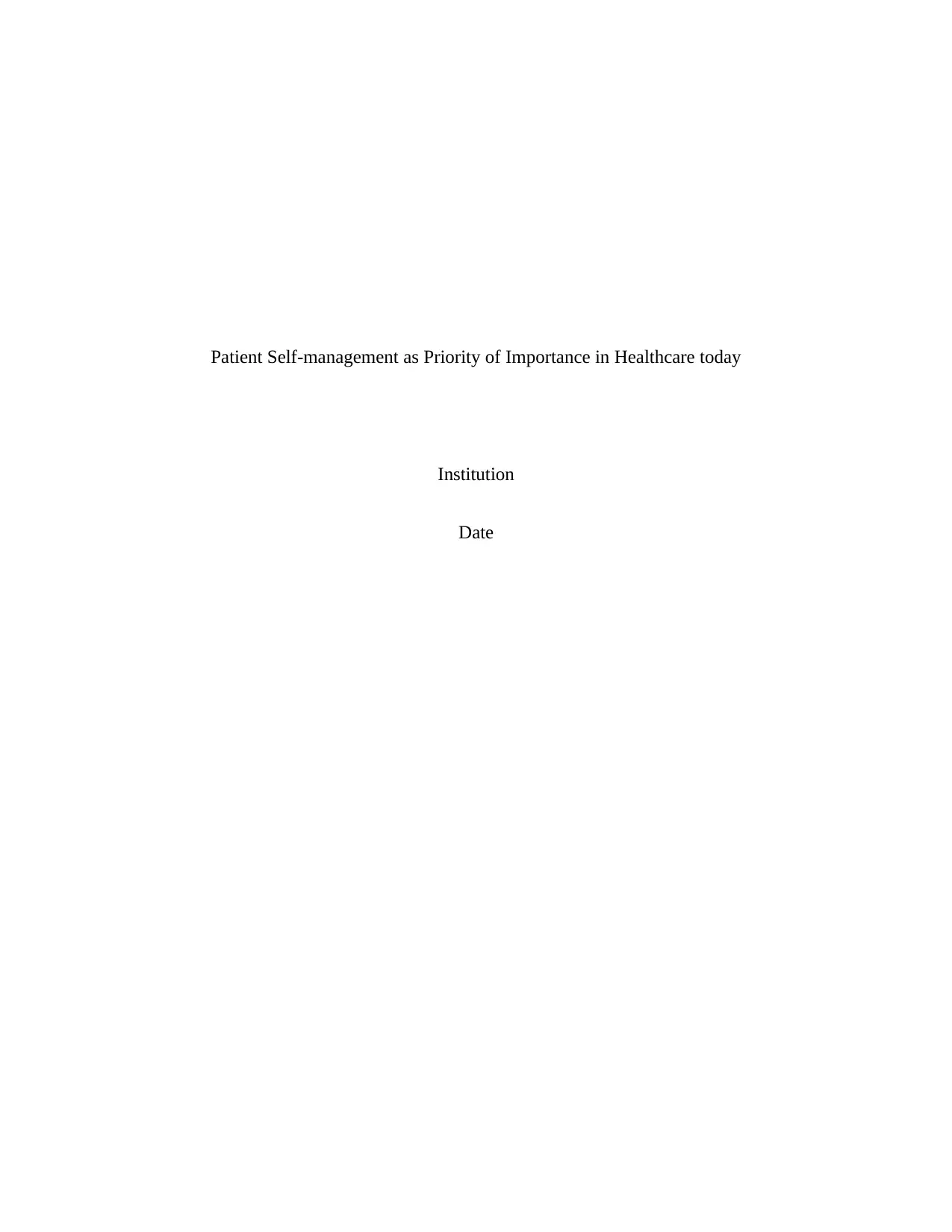
Patient Self-management as Priority of Importance in Healthcare today
Institution
Date
Institution
Date
Paraphrase This Document
Need a fresh take? Get an instant paraphrase of this document with our AI Paraphraser
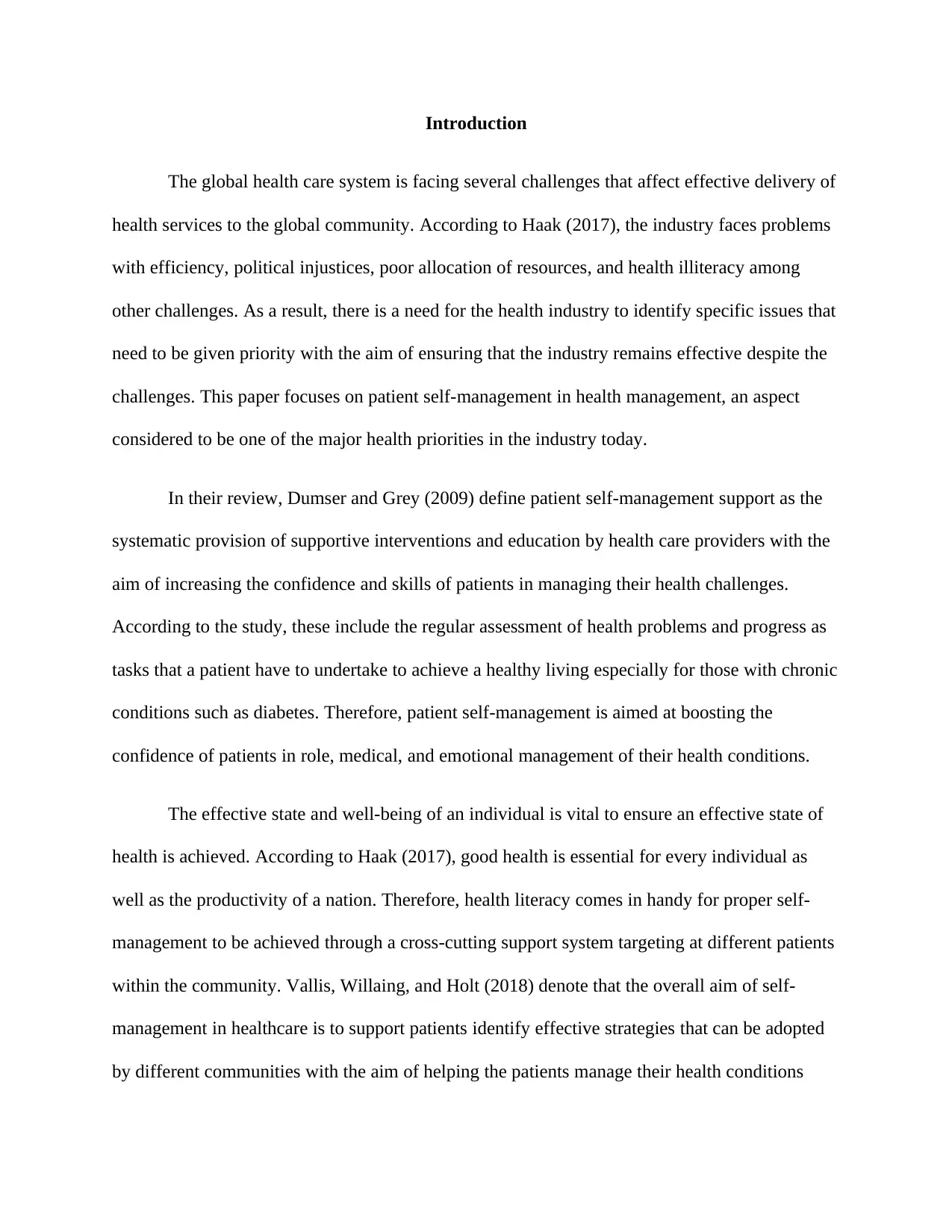
Introduction
The global health care system is facing several challenges that affect effective delivery of
health services to the global community. According to Haak (2017), the industry faces problems
with efficiency, political injustices, poor allocation of resources, and health illiteracy among
other challenges. As a result, there is a need for the health industry to identify specific issues that
need to be given priority with the aim of ensuring that the industry remains effective despite the
challenges. This paper focuses on patient self-management in health management, an aspect
considered to be one of the major health priorities in the industry today.
In their review, Dumser and Grey (2009) define patient self-management support as the
systematic provision of supportive interventions and education by health care providers with the
aim of increasing the confidence and skills of patients in managing their health challenges.
According to the study, these include the regular assessment of health problems and progress as
tasks that a patient have to undertake to achieve a healthy living especially for those with chronic
conditions such as diabetes. Therefore, patient self-management is aimed at boosting the
confidence of patients in role, medical, and emotional management of their health conditions.
The effective state and well-being of an individual is vital to ensure an effective state of
health is achieved. According to Haak (2017), good health is essential for every individual as
well as the productivity of a nation. Therefore, health literacy comes in handy for proper self-
management to be achieved through a cross-cutting support system targeting at different patients
within the community. Vallis, Willaing, and Holt (2018) denote that the overall aim of self-
management in healthcare is to support patients identify effective strategies that can be adopted
by different communities with the aim of helping the patients manage their health conditions
The global health care system is facing several challenges that affect effective delivery of
health services to the global community. According to Haak (2017), the industry faces problems
with efficiency, political injustices, poor allocation of resources, and health illiteracy among
other challenges. As a result, there is a need for the health industry to identify specific issues that
need to be given priority with the aim of ensuring that the industry remains effective despite the
challenges. This paper focuses on patient self-management in health management, an aspect
considered to be one of the major health priorities in the industry today.
In their review, Dumser and Grey (2009) define patient self-management support as the
systematic provision of supportive interventions and education by health care providers with the
aim of increasing the confidence and skills of patients in managing their health challenges.
According to the study, these include the regular assessment of health problems and progress as
tasks that a patient have to undertake to achieve a healthy living especially for those with chronic
conditions such as diabetes. Therefore, patient self-management is aimed at boosting the
confidence of patients in role, medical, and emotional management of their health conditions.
The effective state and well-being of an individual is vital to ensure an effective state of
health is achieved. According to Haak (2017), good health is essential for every individual as
well as the productivity of a nation. Therefore, health literacy comes in handy for proper self-
management to be achieved through a cross-cutting support system targeting at different patients
within the community. Vallis, Willaing, and Holt (2018) denote that the overall aim of self-
management in healthcare is to support patients identify effective strategies that can be adopted
by different communities with the aim of helping the patients manage their health conditions
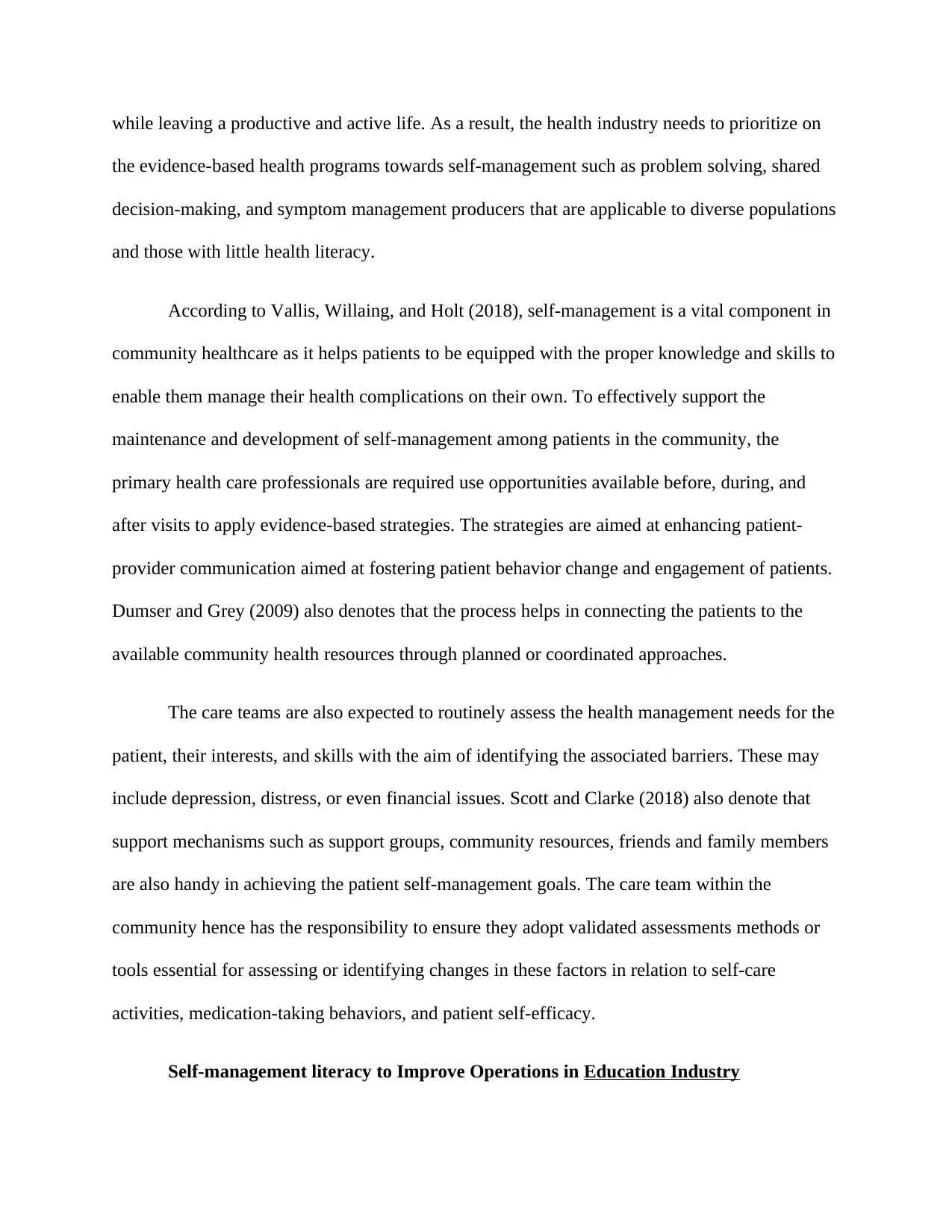
while leaving a productive and active life. As a result, the health industry needs to prioritize on
the evidence-based health programs towards self-management such as problem solving, shared
decision-making, and symptom management producers that are applicable to diverse populations
and those with little health literacy.
According to Vallis, Willaing, and Holt (2018), self-management is a vital component in
community healthcare as it helps patients to be equipped with the proper knowledge and skills to
enable them manage their health complications on their own. To effectively support the
maintenance and development of self-management among patients in the community, the
primary health care professionals are required use opportunities available before, during, and
after visits to apply evidence-based strategies. The strategies are aimed at enhancing patient-
provider communication aimed at fostering patient behavior change and engagement of patients.
Dumser and Grey (2009) also denotes that the process helps in connecting the patients to the
available community health resources through planned or coordinated approaches.
The care teams are also expected to routinely assess the health management needs for the
patient, their interests, and skills with the aim of identifying the associated barriers. These may
include depression, distress, or even financial issues. Scott and Clarke (2018) also denote that
support mechanisms such as support groups, community resources, friends and family members
are also handy in achieving the patient self-management goals. The care team within the
community hence has the responsibility to ensure they adopt validated assessments methods or
tools essential for assessing or identifying changes in these factors in relation to self-care
activities, medication-taking behaviors, and patient self-efficacy.
Self-management literacy to Improve Operations in Education Industry
the evidence-based health programs towards self-management such as problem solving, shared
decision-making, and symptom management producers that are applicable to diverse populations
and those with little health literacy.
According to Vallis, Willaing, and Holt (2018), self-management is a vital component in
community healthcare as it helps patients to be equipped with the proper knowledge and skills to
enable them manage their health complications on their own. To effectively support the
maintenance and development of self-management among patients in the community, the
primary health care professionals are required use opportunities available before, during, and
after visits to apply evidence-based strategies. The strategies are aimed at enhancing patient-
provider communication aimed at fostering patient behavior change and engagement of patients.
Dumser and Grey (2009) also denotes that the process helps in connecting the patients to the
available community health resources through planned or coordinated approaches.
The care teams are also expected to routinely assess the health management needs for the
patient, their interests, and skills with the aim of identifying the associated barriers. These may
include depression, distress, or even financial issues. Scott and Clarke (2018) also denote that
support mechanisms such as support groups, community resources, friends and family members
are also handy in achieving the patient self-management goals. The care team within the
community hence has the responsibility to ensure they adopt validated assessments methods or
tools essential for assessing or identifying changes in these factors in relation to self-care
activities, medication-taking behaviors, and patient self-efficacy.
Self-management literacy to Improve Operations in Education Industry
⊘ This is a preview!⊘
Do you want full access?
Subscribe today to unlock all pages.

Trusted by 1+ million students worldwide
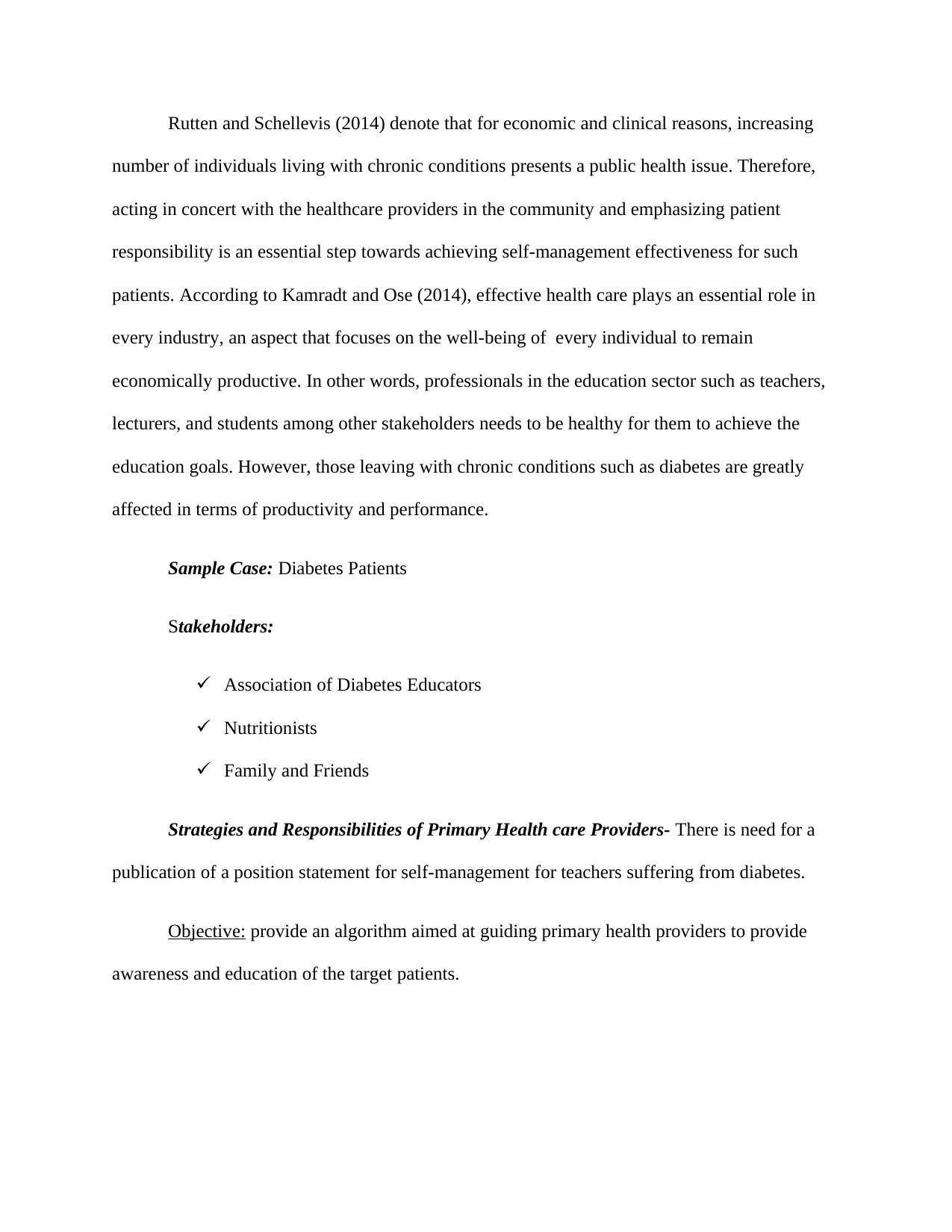
Rutten and Schellevis (2014) denote that for economic and clinical reasons, increasing
number of individuals living with chronic conditions presents a public health issue. Therefore,
acting in concert with the healthcare providers in the community and emphasizing patient
responsibility is an essential step towards achieving self-management effectiveness for such
patients. According to Kamradt and Ose (2014), effective health care plays an essential role in
every industry, an aspect that focuses on the well-being of every individual to remain
economically productive. In other words, professionals in the education sector such as teachers,
lecturers, and students among other stakeholders needs to be healthy for them to achieve the
education goals. However, those leaving with chronic conditions such as diabetes are greatly
affected in terms of productivity and performance.
Sample Case: Diabetes Patients
Stakeholders:
Association of Diabetes Educators
Nutritionists
Family and Friends
Strategies and Responsibilities of Primary Health care Providers- There is need for a
publication of a position statement for self-management for teachers suffering from diabetes.
Objective: provide an algorithm aimed at guiding primary health providers to provide
awareness and education of the target patients.
number of individuals living with chronic conditions presents a public health issue. Therefore,
acting in concert with the healthcare providers in the community and emphasizing patient
responsibility is an essential step towards achieving self-management effectiveness for such
patients. According to Kamradt and Ose (2014), effective health care plays an essential role in
every industry, an aspect that focuses on the well-being of every individual to remain
economically productive. In other words, professionals in the education sector such as teachers,
lecturers, and students among other stakeholders needs to be healthy for them to achieve the
education goals. However, those leaving with chronic conditions such as diabetes are greatly
affected in terms of productivity and performance.
Sample Case: Diabetes Patients
Stakeholders:
Association of Diabetes Educators
Nutritionists
Family and Friends
Strategies and Responsibilities of Primary Health care Providers- There is need for a
publication of a position statement for self-management for teachers suffering from diabetes.
Objective: provide an algorithm aimed at guiding primary health providers to provide
awareness and education of the target patients.
Paraphrase This Document
Need a fresh take? Get an instant paraphrase of this document with our AI Paraphraser
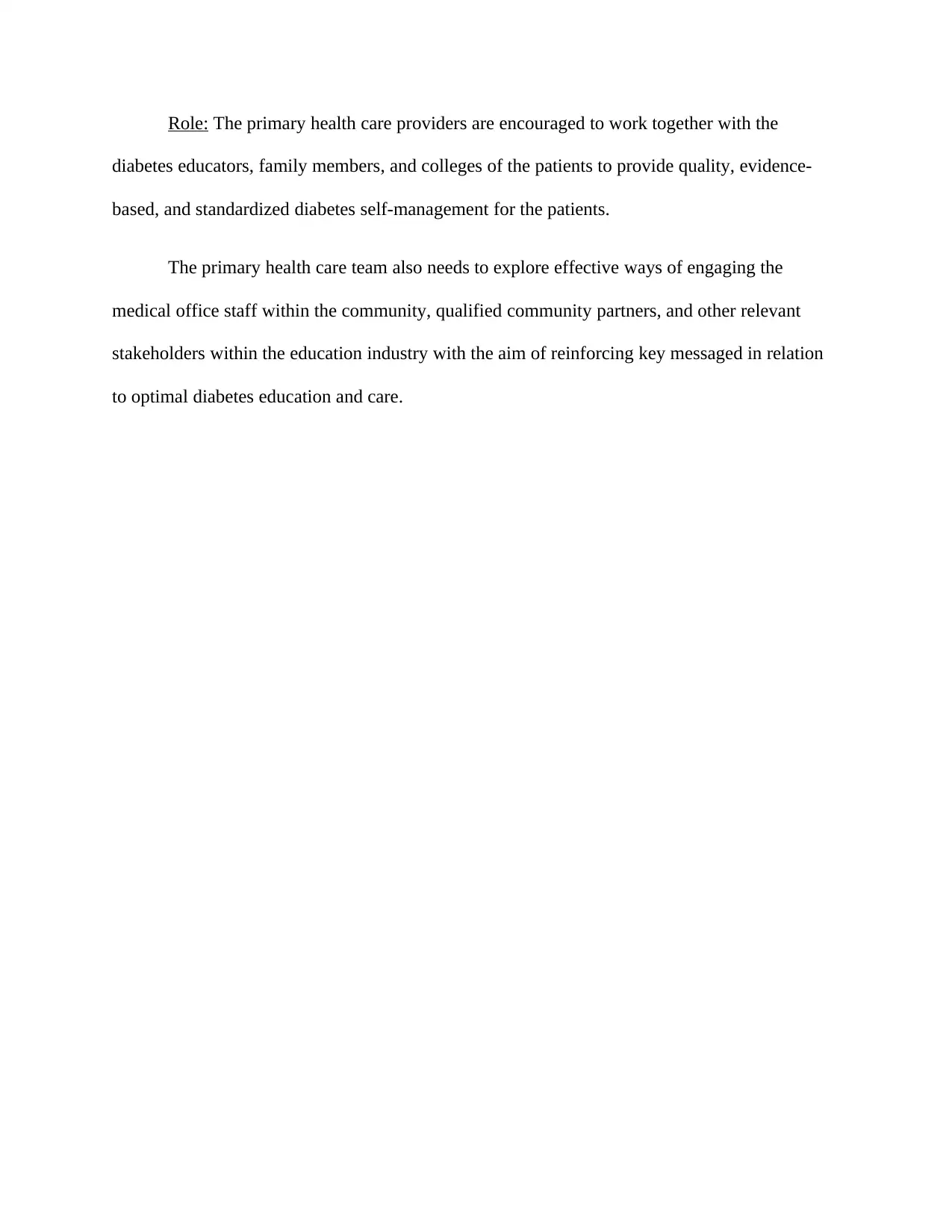
Role: The primary health care providers are encouraged to work together with the
diabetes educators, family members, and colleges of the patients to provide quality, evidence-
based, and standardized diabetes self-management for the patients.
The primary health care team also needs to explore effective ways of engaging the
medical office staff within the community, qualified community partners, and other relevant
stakeholders within the education industry with the aim of reinforcing key messaged in relation
to optimal diabetes education and care.
diabetes educators, family members, and colleges of the patients to provide quality, evidence-
based, and standardized diabetes self-management for the patients.
The primary health care team also needs to explore effective ways of engaging the
medical office staff within the community, qualified community partners, and other relevant
stakeholders within the education industry with the aim of reinforcing key messaged in relation
to optimal diabetes education and care.
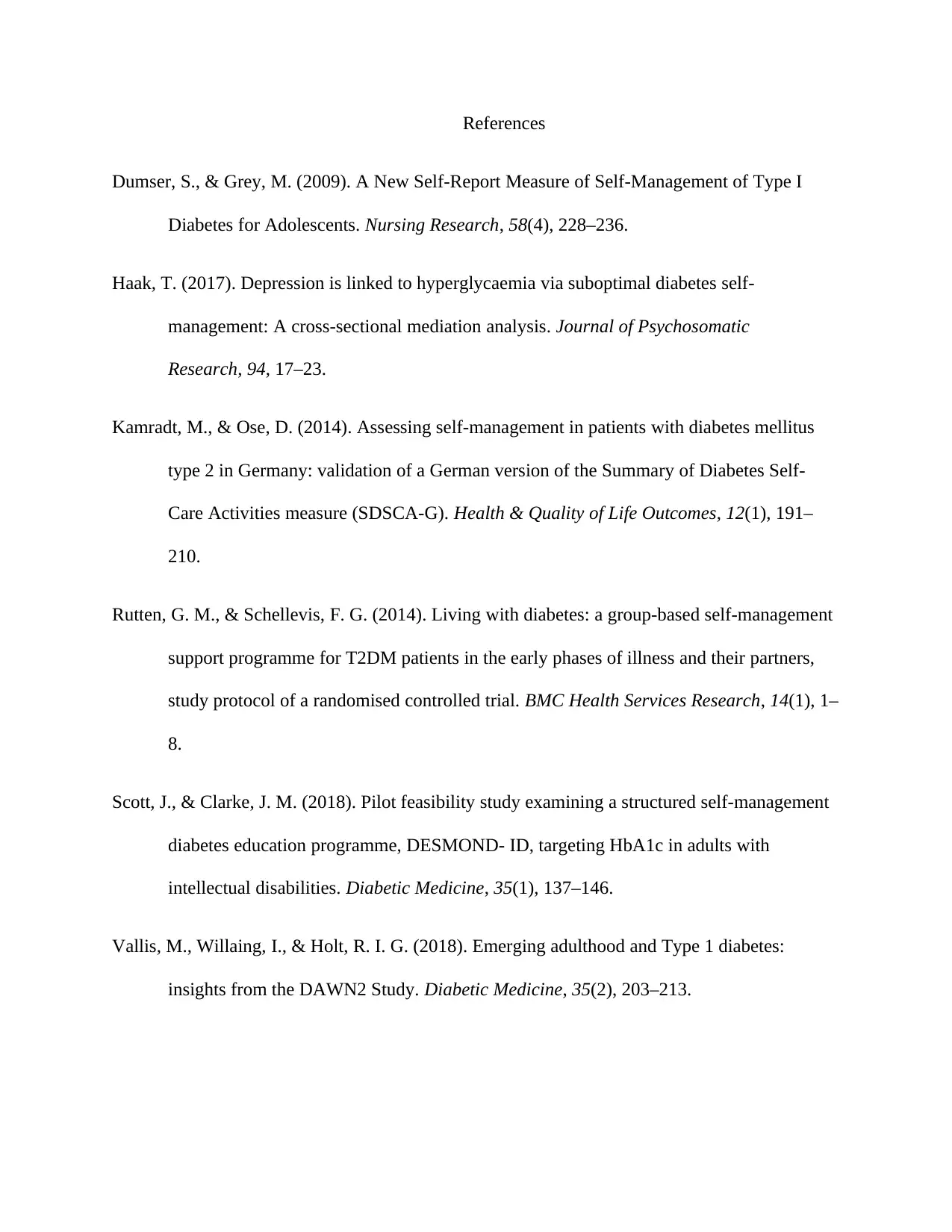
References
Dumser, S., & Grey, M. (2009). A New Self-Report Measure of Self-Management of Type I
Diabetes for Adolescents. Nursing Research, 58(4), 228–236.
Haak, T. (2017). Depression is linked to hyperglycaemia via suboptimal diabetes self-
management: A cross-sectional mediation analysis. Journal of Psychosomatic
Research, 94, 17–23.
Kamradt, M., & Ose, D. (2014). Assessing self-management in patients with diabetes mellitus
type 2 in Germany: validation of a German version of the Summary of Diabetes Self-
Care Activities measure (SDSCA-G). Health & Quality of Life Outcomes, 12(1), 191–
210.
Rutten, G. M., & Schellevis, F. G. (2014). Living with diabetes: a group-based self-management
support programme for T2DM patients in the early phases of illness and their partners,
study protocol of a randomised controlled trial. BMC Health Services Research, 14(1), 1–
8.
Scott, J., & Clarke, J. M. (2018). Pilot feasibility study examining a structured self-management
diabetes education programme, DESMOND- ID, targeting HbA1c in adults with
intellectual disabilities. Diabetic Medicine, 35(1), 137–146.
Vallis, M., Willaing, I., & Holt, R. I. G. (2018). Emerging adulthood and Type 1 diabetes:
insights from the DAWN2 Study. Diabetic Medicine, 35(2), 203–213.
Dumser, S., & Grey, M. (2009). A New Self-Report Measure of Self-Management of Type I
Diabetes for Adolescents. Nursing Research, 58(4), 228–236.
Haak, T. (2017). Depression is linked to hyperglycaemia via suboptimal diabetes self-
management: A cross-sectional mediation analysis. Journal of Psychosomatic
Research, 94, 17–23.
Kamradt, M., & Ose, D. (2014). Assessing self-management in patients with diabetes mellitus
type 2 in Germany: validation of a German version of the Summary of Diabetes Self-
Care Activities measure (SDSCA-G). Health & Quality of Life Outcomes, 12(1), 191–
210.
Rutten, G. M., & Schellevis, F. G. (2014). Living with diabetes: a group-based self-management
support programme for T2DM patients in the early phases of illness and their partners,
study protocol of a randomised controlled trial. BMC Health Services Research, 14(1), 1–
8.
Scott, J., & Clarke, J. M. (2018). Pilot feasibility study examining a structured self-management
diabetes education programme, DESMOND- ID, targeting HbA1c in adults with
intellectual disabilities. Diabetic Medicine, 35(1), 137–146.
Vallis, M., Willaing, I., & Holt, R. I. G. (2018). Emerging adulthood and Type 1 diabetes:
insights from the DAWN2 Study. Diabetic Medicine, 35(2), 203–213.
⊘ This is a preview!⊘
Do you want full access?
Subscribe today to unlock all pages.

Trusted by 1+ million students worldwide

1 out of 7
Related Documents
Your All-in-One AI-Powered Toolkit for Academic Success.
+13062052269
info@desklib.com
Available 24*7 on WhatsApp / Email
![[object Object]](/_next/static/media/star-bottom.7253800d.svg)
Unlock your academic potential
Copyright © 2020–2026 A2Z Services. All Rights Reserved. Developed and managed by ZUCOL.




